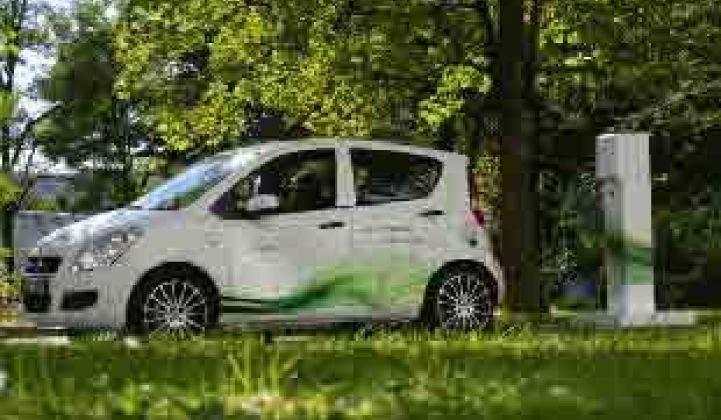Three years ago, Siemens said that it prided itself on delivering “the future of energy today” in an announcement about an electric-vehicle charging partnership with SAP.
The future, it turns out, is still a while away.
Siemens announced on Tuesday it would give up its production of public charging stations for electric vehicles. The German conglomerate will still make in-home charging stations, according to reports.
"It's true that we're withdrawing from that business segment, because the e-mobility market has grown more slowly than originally expected," the company said in a statement. "Together with the staff council, we're currently looking for a solution as to where to employ the workers affected by the move." Siemens also told Greentech Media that charging station hardware offered less and less potential for differentiation from the competition.
Siemens specifically noted the slow rate of adoption in the German market as a driver of the decision. In that country, just over 4,000 electric cars were registered in 2012. Most of those cars, according to reports, are gasoline hybrids that don't require the public charging infrastructure that pure-play electric vehicles do.
But the market is not as slow in other areas, the company reported. Most of the growth in EV charging infrastructure is expected to be in Asia. Japan saw more than 24,000 new electric vehicles registered last year.
A recent analysis from IHS Automotive estimated that DC fast-charging stations alone would balloon to 200,000 by 2020 from about 2,000 today. Navigant Research, however, estimates there will be 100,000 fast chargers worldwide by 2020.
The picture is very different from country to country and state to state. Germany's Dutch neighbors are building a nationwide electric vehicle fast-charging network using technology from ABB. In the U.S., California is also building a statewide electric vehicle-charging infrastructure, and Tesla has plans for a nationwide superhighway for its vehicles.
For now though, the bulk of charging does happen at home. The piecemeal adoption of public charging infrastructure combined with the sluggish sales of electric vehicles is already reshaping the market.
Earlier this month, ECOtality (NASDAQ: ECTY), which has won more than $100 million in federal grants to support a nationwide EV charging rollout, announced it failed to transition from its government project to competing in the open market and may have to go into bankruptcy.
Even in the residential segment, changes are already coming to the market. Bosch unveiled a level 2 charging station at about half the price of other chargers earlier this year. Bosch found that, at this time, customers were not looking for networking capability so the car can connect with the utility or home.
Siemens is exiting the public charging business, but it is not turning away from other areas of electric mobility. The company said it would focus on electric vehicle motors, vehicle to grid communications and wireless charging.



